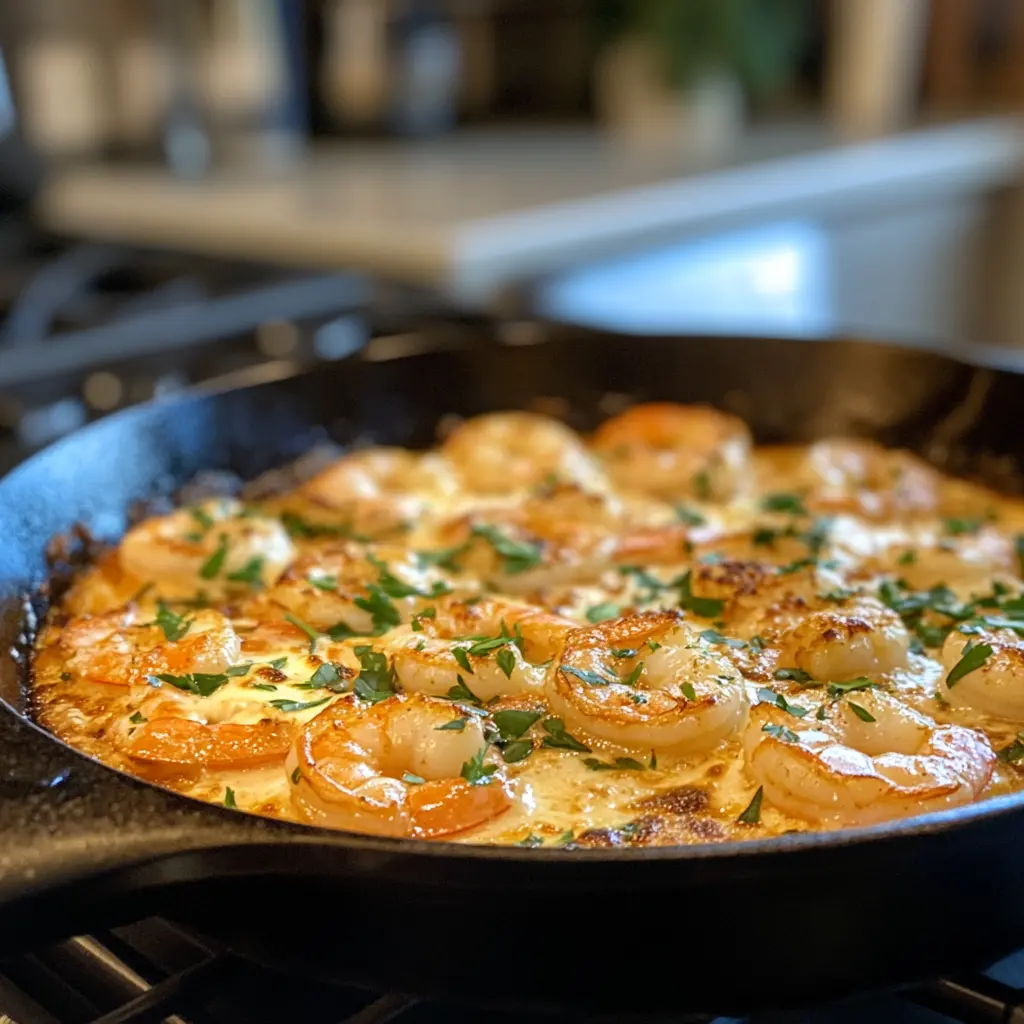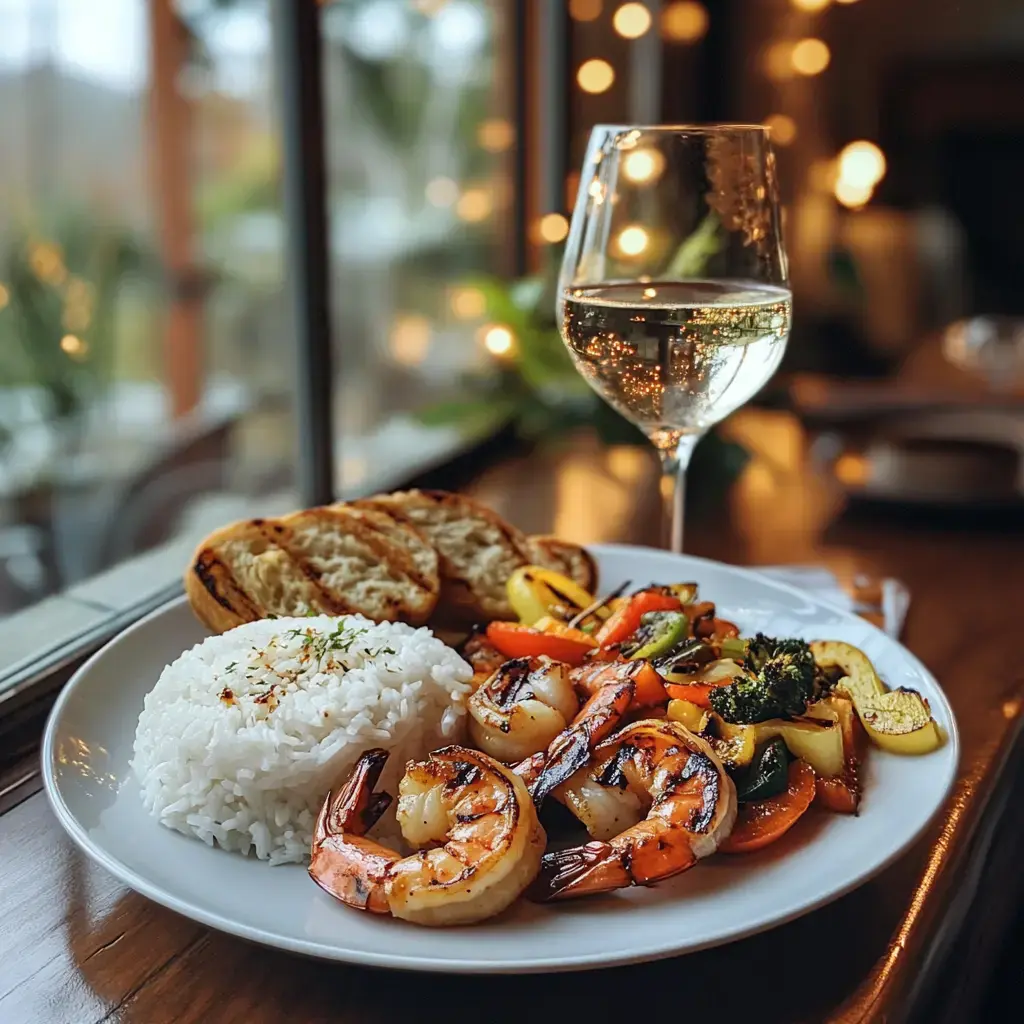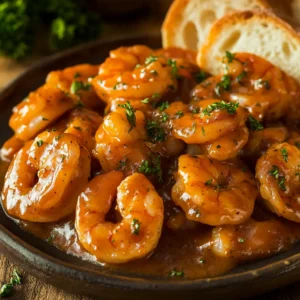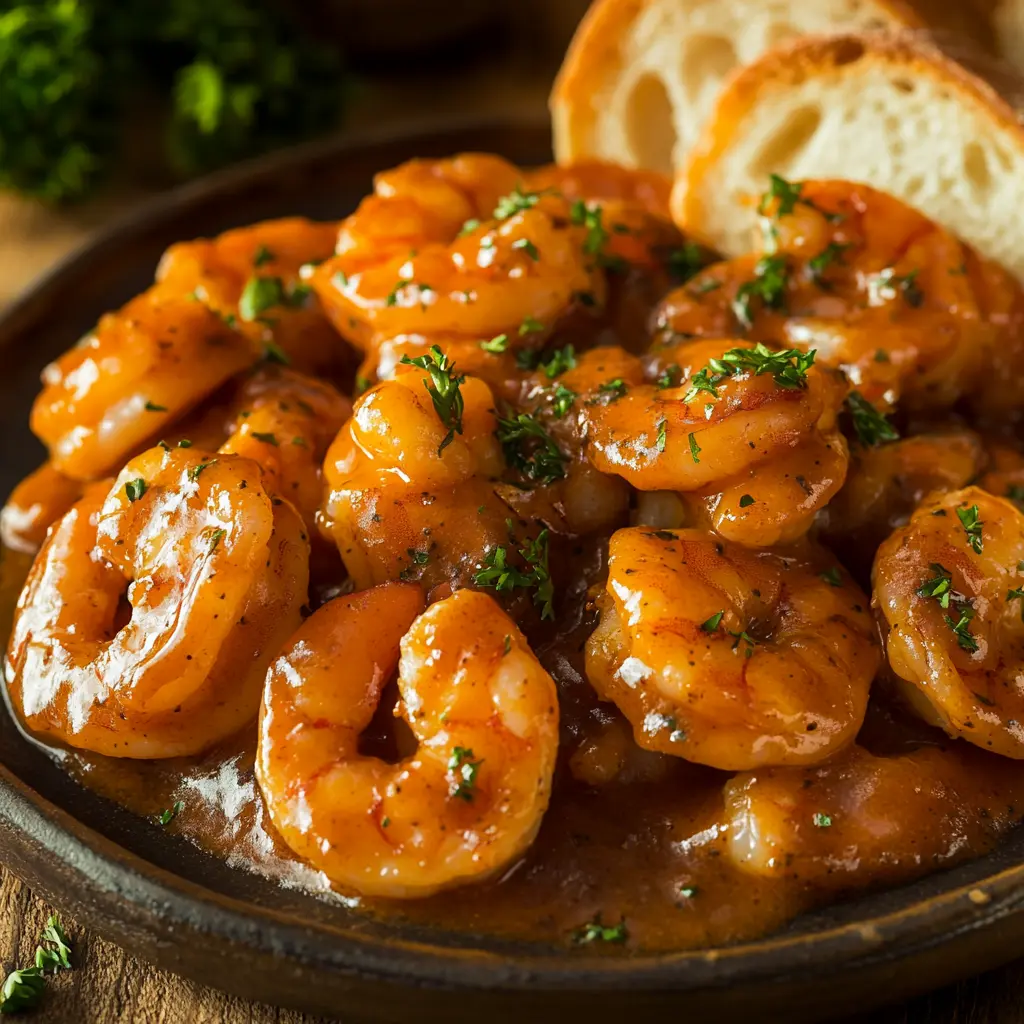Introduction
New Orleans Barbecue Shrimp is a signature dish from Louisiana that showcases the vibrant flavors of Creole cuisine. Despite its name, this dish isn’t prepared on a barbecue grill. Instead, it features succulent shrimp cooked in a rich and buttery sauce infused with Creole spices, Worcestershire sauce, garlic, and lemon juice. Known for its bold, tangy, and slightly spicy flavor profile, it’s a staple in New Orleans restaurants and a beloved home-cooked meal.
The origins of New Orleans Barbecue Shrimp trace back to the mid-20th century, believed to have been created in response to Italian culinary influences combined with the abundance of fresh Gulf shrimp. It’s a dish that perfectly encapsulates the spirit of New Orleans: rich, indulgent, and full of character. Whether served with crusty French bread to soak up the sauce or paired with rice for a heartier meal, it is an unforgettable culinary experience.
The Origins of the Dish
History of New Orleans Barbecue Shrimp
New Orleans Barbecue Shrimp was born in the 1950s at Pascal’s Manale, a famous Italian-Creole restaurant in New Orleans. The story goes that a regular customer requested a shrimp dish inspired by a meal he had enjoyed in Chicago. The chef improvised, blending butter, Worcestershire sauce, and Creole spices to create what is now a legendary dish. Despite its name, there’s no barbecue grill involved; instead, the name likely refers to the smoky, tangy flavors reminiscent of barbecue sauces.
Why It’s Not Grilled
The misnomer of “barbecue” often confuses first-timers. Unlike traditional barbecue, which involves grilling or smoking over an open flame, this dish is cooked in a skillet or pan. The focus is on creating a luscious, aromatic sauce that coats the shrimp rather than charring them. This technique keeps the shrimp tender and allows the sauce to shine as the star of the dish.
How Creole Cuisine Influenced Barbecue Shrimp
New Orleans Barbecue Shrimp is deeply rooted in the city’s Creole culinary traditions, which blend French, Spanish, African, and Italian influences. The dish’s use of Worcestershire sauce reflects the Creole penchant for layering flavors, while its buttery base echoes French cooking. Creole cuisine is celebrated for its ability to transform simple, fresh ingredients into complex, satisfying meals, and this shrimp dish is a prime example of that mastery.
Key Ingredients for New Orleans Barbecue Shrimp
Choosing Fresh Shrimp for New Orleans Barbecue Shrimp
The star of New Orleans Barbecue Shrimp is, of course, the shrimp itself. Fresh Gulf shrimp are traditionally used for this dish, prized for their sweetness and firm texture. Large or jumbo shrimp with the shells on are preferred, as the shells not only help retain moisture during cooking but also add flavor to the dish. If fresh Gulf shrimp aren’t available, high-quality frozen shrimp can be a good alternative, but ensuring they’re raw and deveined is crucial.
The Flavor Foundation: Seasoning and Spices
The seasoning blend is what sets this dish apart. A mix of Creole spices, including paprika, cayenne pepper, black pepper, and garlic powder, creates a balance of heat and depth. Worcestershire sauce, a staple in the recipe, adds a tangy, umami-rich undertone that pairs beautifully with the shrimp. Freshly minced garlic and a touch of lemon juice round out the flavor profile, adding brightness to the rich sauce.
Butter and Spices in Creole Shrimp Recipes
The buttery sauce is the soul of New Orleans Barbecue Shrimp. Traditionally, unsalted butter is used to control the saltiness of the dish, and it’s melted slowly to form a creamy base. This buttery base is infused with the seasonings, garlic, Worcestershire sauce, and lemon juice, creating a luscious, aromatic sauce that clings to the shrimp.
Additional Essentials
While the core ingredients are straightforward, some recipes include optional add-ins like hot sauce for an extra kick, fresh herbs such as parsley for garnish, or even a splash of white wine for depth. Crusty French bread is an essential accompaniment, as it’s perfect for soaking up the flavorful sauce.
Cooking Techniques for New Orleans Barbecue Shrimp

Traditional Methods for Creole Shrimp Recipes
The classic method for preparing New Orleans Barbecue Shrimp involves cooking the shrimp in a skillet or saucepan over medium heat. The process starts with melting butter and sautéing minced garlic until aromatic. Worcestershire sauce, Creole spices, and lemon juice are then added to create a fragrant, flavorful sauce. The shrimp are cooked directly in this mixture, allowing the sauce to infuse every bite. The key is to cook the shrimp just until they turn pink and are tender, typically 3–5 minutes, as overcooking can result in a rubbery texture.
Modern Twists on New Orleans Barbecue Shrimp
Modern takes on the recipe often include enhancements that reflect contemporary palates. For instance, chefs may deglaze the pan with white wine or use a combination of butter and olive oil to reduce the saturated fat content. Another popular twist involves adding heavy cream or coconut milk to create a thicker, more indulgent sauce. For a spicy kick, some recipes incorporate cayenne pepper or a generous splash of hot sauce.
Tips for Perfecting Your Creole Shrimp Recipe
Achieving the best flavor and texture for New Orleans Barbecue Shrimp requires attention to detail. Here are some essential tips:
- Use high-quality ingredients: Fresh shrimp and real butter make a noticeable difference in the final dish.
- Don’t rush the sauce: Allow the spices and aromatics to meld together by simmering the sauce gently.
- Shell-on shrimp are best: Cooking shrimp with their shells helps lock in flavor and moisture. Serve them with a bowl for discarding shells to make the dining experience easier.
- Balance the flavors: Adjust the seasoning to taste, adding a bit more lemon juice for acidity or Worcestershire sauce for depth.
Common Mistakes to Avoid
- Overcooking the shrimp: Shrimp cook quickly; remove them from heat as soon as they turn pink and are opaque.
- Skipping the bread: The sauce is as important as the shrimp, and without crusty bread, you miss a vital part of the experience.
- Using salted butter without adjusting seasonings: This can result in an overly salty dish, so always taste as you cook.
Serving Suggestions for New Orleans Barbecue Shrimp
Classic Pairings for a Creole Shrimp Recipe
New Orleans Barbecue Shrimp is best enjoyed with sides and accompaniments that complement its rich and tangy flavors. Traditionally, crusty French bread is served alongside, perfect for sopping up the buttery sauce. This bread not only provides texture but also ensures no part of the flavorful sauce goes to waste.
Other classic pairings include:
- Rice: Steamed white rice or creamy risotto makes for a hearty addition, soaking up the sauce beautifully.
- Mashed Potatoes: The creamy texture of mashed potatoes provides a comforting base for the bold shrimp dish.
- Cornbread: A sweet, crumbly cornbread can add a Southern touch to the meal.

Best Side Dishes for New Orleans Barbecue Shrimp
For a complete New Orleans-style meal, consider adding sides that reflect the region’s culinary flair.
- Collard Greens: Slow-cooked greens bring an earthy balance to the richness of the shrimp.
- Grilled Vegetables: Lightly charred vegetables like zucchini or asparagus provide a fresh contrast.
- Seafood Gumbo: Pairing the shrimp with a small bowl of gumbo enhances the overall seafood experience.
Presentation Tips
A visually appealing plate elevates the dining experience. Here’s how to present New Orleans Barbecue Shrimp:
- Serve the shrimp directly in a shallow dish, allowing the vibrant sauce to pool at the bottom.
- Garnish with fresh parsley or thinly sliced green onions for a pop of color.
- Place the bread on the side or in a basket for easy access.
- Add lemon wedges on the side for diners who may want an extra citrus kick.
Drinks That Go Well with Creole Shrimp Recipes
The bold flavors of New Orleans Barbecue Shrimp call for equally exciting beverage pairings.
- Beer: A cold lager or pale ale balances the spice and richness.
- White Wine: A crisp Sauvignon Blanc or buttery Chardonnay complements the shrimp and sauce.
- Cocktails: A Sazerac or Hurricane cocktail adds a classic New Orleans vibe to the meal.
Cultural Significance
Role in New Orleans Cuisine
New Orleans Barbecue Shrimp holds a special place in the city’s culinary landscape. It embodies the fusion of flavors and techniques that define Creole cuisine, a blend of French, Spanish, Italian, African, and Caribbean influences. The dish’s reliance on simple ingredients elevated by careful seasoning and preparation speaks to the Creole tradition of turning humble components into luxurious meals.
As a staple in both upscale restaurants and home kitchens, this dish represents the conviviality and indulgence of New Orleans dining culture. Whether enjoyed at a fine-dining establishment or a neighborhood eatery, it’s a dish that brings people together and celebrates the city’s love for bold, flavorful food.
Its Popularity Beyond Louisiana
While originally a New Orleans specialty, barbecue shrimp has gained popularity nationwide. Its irresistible combination of flavors and relatively simple preparation have made it a favorite at Cajun and Creole-inspired restaurants across the United States. Cooking shows, food blogs, and recipe adaptations have further boosted its recognition, introducing this iconic dish to a global audience.
Connection to Regional Ingredients
The abundance of fresh Gulf shrimp is integral to the authenticity of New Orleans Barbecue Shrimp. Louisiana’s Gulf Coast provides some of the best shrimp in the world, and the dish showcases their natural sweetness and tender texture. The use of Creole spices and local ingredients like Worcestershire sauce and fresh lemons further ties the dish to its geographical roots.
A Dish for All Occasions
Part of the dish’s enduring appeal lies in its versatility. It can be a casual weeknight dinner or the centerpiece of a festive gathering. Its rich flavors make it suitable for celebrations, while its straightforward preparation means it’s accessible for everyday cooking. For many, New Orleans Barbecue Shrimp represents comfort, indulgence, and a connection to the vibrant culinary heritage of Louisiana.
Common Variations
Spicy Versions
For those who crave heat, spicy variations of New Orleans Barbecue Shrimp are a popular twist. By increasing the amount of cayenne pepper or adding a splash of hot sauce, the dish can take on a fiery kick that pairs beautifully with its buttery base. Other options include incorporating jalapeño slices or a pinch of red pepper flakes to amplify the spice level.
Mild and Creamy Adaptations
Not everyone enjoys intense spices, and mild adaptations of the dish are equally flavorful. Reducing the cayenne and black pepper while increasing the garlic and lemon allows the subtler flavors to shine. Some cooks add a touch of heavy cream or crème fraîche to the sauce for a milder, creamier version that tempers the boldness while adding richness.
Garlic-Heavy Styles
Garlic lovers can double or even triple the amount of garlic in the recipe to create a version with a more pronounced aromatic quality. Roasted garlic, with its sweeter and more mellow flavor, can also be used as a flavorful addition to the sauce. This variation pairs particularly well with crusty bread, enhancing the savory, garlicky experience.
Gluten-Free and Healthier Options
For those with dietary restrictions or seeking a lighter alternative, adjustments can be made without compromising the dish’s essence.
- Replace Worcestershire sauce with gluten-free alternatives.
- Substitute butter with plant-based versions for a dairy-free or vegan approach.
- Serve the shrimp over zucchini noodles or cauliflower rice to reduce carbs while maintaining a satisfying texture.
Gourmet Enhancements
Elevating New Orleans Barbecue Shrimp to a fine-dining experience can involve premium ingredients or presentation tweaks:
- Use jumbo prawns or langoustines: These larger crustaceans add visual appeal and an even richer taste.
- Infuse the sauce with herbs: Fresh thyme, tarragon, or bay leaves can provide an aromatic complexity.
- Finish with flambé: A splash of brandy or rum ignited at the end of cooking creates a dramatic presentation and enhances flavor.
Global Inspirations
As the dish spreads worldwide, chefs have infused their own culinary traditions into the recipe.
- In Asian-inspired variations, soy sauce and ginger may replace Worcestershire, while sesame oil adds depth.
- Mediterranean versions might include sun-dried tomatoes, olives, or capers for a tangy twist.
- Caribbean-style shrimp barbecue could feature coconut milk and tropical spices like allspice and nutmeg.
FAQs
What makes New Orleans Barbecue Shrimp unique?
The unique combination of buttery richness, tangy Worcestershire sauce, and bold Creole spices distinguishes this dish from other shrimp recipes. Its misnomer as “barbecue” and the use of shell-on shrimp add to its charm.
Can I make this dish ahead of time?
While New Orleans Barbecue Shrimp is best served fresh, the sauce can be prepared a day in advance and refrigerated. Simply reheat the sauce and cook the shrimp just before serving.
What type of shrimp should I use?
Large or jumbo Gulf shrimp with shells on are ideal for this recipe, as they add flavor and retain their texture during cooking. If unavailable, high-quality frozen shrimp are a good alternative.
Is it possible to make a vegan version?
Yes, you can create a vegan version by substituting shrimp with large mushrooms or tofu and replacing butter with plant-based alternatives. Vegan Worcestershire sauce is also available for a similar tangy flavor.
What’s the best way to store leftovers?
Store leftovers in an airtight container in the refrigerator for up to 2 days. Reheat gently over low heat, adding a splash of water or stock to loosen the sauce.
How do I prevent overcooking the shrimp?
To avoid overcooking, add the shrimp to the sauce only after it has been fully prepared. Cook the shrimp just until they turn pink and are firm to the touch, which usually takes 3–5 minutes.
Conclusion
New Orleans Barbecue Shrimp is a quintessential dish that showcases the bold and diverse flavors of Creole cuisine. From its rich, buttery sauce to its perfectly seasoned shrimp, it’s a recipe that embodies the culinary spirit of New Orleans. Whether enjoyed at a local restaurant or recreated at home, it offers a taste of Louisiana’s vibrant food culture. With its versatility, ease of preparation, and deeply satisfying flavor, it’s no wonder this dish has become a favorite far beyond its origins.

New Orleans Barbecue Shrimp
Equipment
- Large Skillet
- Mixing Bowl
- Wooden Spoon
Ingredients
Barbecue Shrimp Base
- 1 lb Gulf shrimp large, shell-on, deveined
- 1/2 cup unsalted butter cut into pieces
- 2 tbsp Worcestershire sauce
- 2 cloves garlic minced
- 1 lemon juiced
- 1 tsp Creole seasoning
- 1/2 tsp cayenne pepper optional, for extra heat
- 1/2 tsp paprika
Garnishes and Accompaniments
- chopped parsley for garnish
- crusty French bread for serving
Instructions
- Melt butter in a large skillet over medium heat.
- Add minced garlic and sauté until fragrant, about 1 minute.
- Stir in Worcestershire sauce, lemon juice, Creole seasoning, cayenne pepper, and paprika. Cook for 1–2 minutes to blend flavors.
- Add shrimp to the skillet and cook until they turn pink, about 3–5 minutes, stirring occasionally.
- Garnish with chopped parsley and serve with crusty French bread.

